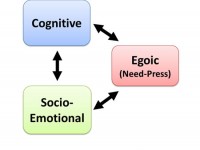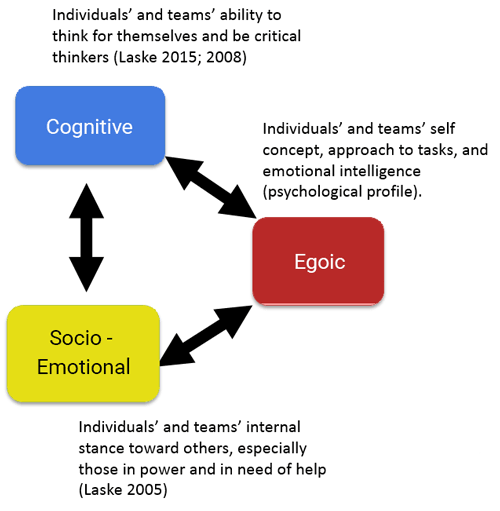in the four entries below, the reader finds four Wikipedia descriptions of CDF, the Constructive Developmental Framework, in Japanese, Spanish, Italian, and German, respectively.The English version of the Wikipedia article on CDF is found at: The original Wikipedia text, written in German, is owed to Prof. Bruno Frischherz, Hochschule fuer Wirtschaft, Luzern, Switzerland. Nick Shannon, London, UK, translated the German version into English. The translations of the English version were made by my students Yohei Kato (Japan), Daniel Alvarez Lama (Spain), and Marco Di Monte (Italy). Matthias Lehmann, Germany, was the coordinator. While it is outwardly a suite of assessment instruments that support semi-structured social-emotional and cognitive interviewing in organizations, respectively, CDF is more than a methodology of research. It has developed into a consulting approach, a teaching approach, and a coaching approach, all of them favoring a dialogical over a monological strategy for working with clients, whether individuals or teams. CDF is therefore best viewed as a methodology for developmentally deepened process consultation in the sense of Edgar Schein's work. 構成主義的発達論のフレームワーク (Yohei Kato) CDF Wikipedia Article, Español (Daniel Alvarez Lama) CDF Wikipedia Italian (Marco Di Monte) CDF Wikipedia Article original (Bruno Frischherz) *** Writings about CDF -- articles and... Read More...
Category: education
Developmental Coaching: A Curtailed Discipline Squashed by Behaviorism
Developmental coaching, announced as a breakthrough in the form of an evidence-based discipline in 2003, has had a sorry history ever since. Since this discipline never acknowledged the -- empirically validated -- distinction between the social-emotional (Kegan 1982) and cognitive development of individuals (Basseches 1984), its impact was reduced to half by its practitioners' fixation on "stages" (whether Loevinger's or Kegan's) and the rampant speculative ideologies derived therefrom. Coaching organizations defensively pushed empirical research evidence into the background while in the meantime co-opting the term 'developmental'. Only a tiny number of coaches learned developmental interviewing and listening, and then only in the social-emotional, not the cognitive, domain. Consequently, developmental coaching was unable to withstand the onslaught of purely behavioristic coaching lore that increasingly gained the field in the form of ICF. the international coach federation. As a result, developmental coaching -- dignified by Wilber's writings in which he only paid lip-service to cognition -- became a misnomer. Having failed to integrate existing research into the unfolding of complex thinking in adults, today (2018) this discipline is only a shadow of its original potential. Relegated to a perspective of 'continuous improvement' -- the lowest level of cognitive functioning in organizations and... Read More...
What Coaches Should Know About Their Clients
In these comments on my keynote read to the June 2015 EMCC conference in Warsaw, Poland, I summarize writings on developmental coaching from my pen since 1999. I have taught this discipline to an international student body between the years of 2000 and 2015 at IDM, the Interdevelopmental Institute, and continue to practice what I have learned in this domain in work with teams and circles. Although some of my articles on developmental coaching have appeared in international journals, to this day (2018) the coaching profession -- especially ICF coaching -- has not absorbed the empirical findings from research in adult development that are the foundations of my practice of evidence-based developmental coaching. Developmental coaching in terms of the IDM Institute I founded in 2000 entails that of the two English meanings of the term development one is "agentic", and the other is "ontic". The first meaning is expressed by a sentence such as "we develop a new team", while the second is referred to in the sentence "this team is immature". In the first case, one is thinking of individuals' development in behavioristic terms, focusing on what outsiders do to support (horizontal) learning, while in the second one focuses... Read More...
Zur Durchdringung organisatorischer Beratung mit Einsichten aus CDF
In diesem Artikel fuehre ich im Einzelnen die Geschichte und die Eigenart des Constructive Developmental Framework (CDF) aus. Ich moechte zeigen wie insbesondere ein soziologischer Beratungsansatz wie New Deal (Gucher 2015), aber auch aehnliche Beratungsvorgehen, durch Einsicht in die lebenslange Entwicklung von Menschen vertieft und im Dialog mit Kunden flexibel werden koennen. Der Nachdruck im Text liegt darauf, dass alle Dimensionen von Sozialkapital -- persoenliche Beziehungen, Emotionen, Aufmerksamkeit und Wissen -- in ihrer Bestehensweise und Verwendung entschieden von dem Reifegrad von Individuen und Teams abhaengen. Dies legt nahe, die auf New Deal beruhenden Interventionen durch sozial-emotionale und kognitive Werkzeuge aus CDF zu bereichern und dadurch zu staerken. Insbesondere erhoeht man durch CDF die Dialogfaehigkeit von Gruppen und Teams und staerkt das fuer eine kollaborative Arbeitsweise notwendige gegenseitige Vertrauen. Der Artikel behandelt sowohl wie man CDF durch Gruppenarbeit am Interdevelopmental Institute erlernt und wie man das erlangte Wissen in Kundenberatung und Coaching einfuehren kann. Anfragen ueber Lehrweise und Kosten der CDF Ausbildung zur dialogischen Beratung bitte an Otto Laske, otto@interdevelopmentals.org, richten. Durchdringung des New Deal mit CDF Feb. 2018 Read More...
New Dialog Methods for Broad-Spectrum Systems Constellations: Comments on the Milano Workshop on Intelligenza Collaborativa Nel Team
As shown at and, on this website, at , a workshop on new dialog methods specifically for creating collaborative intelligence in teams will take place in Milano, Italy, on January 30-31,2018. The workshop is offered by Consulenza Evolutiva, Milano and its Altroove School, and staffed by Lorenzo Campese, Alessandro Rossi, and Otto Laske. The workshop is a pioneering first in that it introduces Broad-Spectrum Systems Constellations which broaden the focus of attention of conventional constellations as detailed in the attached pdf. The workshop is held both in Italian and English. Those interested in signing up for the workshop with Consulenza Evolutiva will find further details on the workshop process below. Broad-Spectrum Systems Constellations Read More...
Improving Management by Design: Novel Tools for Expanding and Deepening the Business Model Design Space
I propose to strengthen the cognitive processes involved in design thinking, especially for cross-functional teams, both through artificial intelligence techniques and focused cognitive coaching. I take as an example of design thinking the canvas metaphor used by Osterwalder and Pigneur (2014, 2010), selecting its CS (customer segment) component for further scrutiny. Specifically, I introduce an amplified form of design thinking called "transformational" thinking that is grounded in research in adult cognitive development over the lifespan (Laske 2008 [2017b/c]). My approach is rooted in DTF, the Dialectical Thought Form Framework developed at the Interdevelopmental Institute (IDM) since the year 2000. In focus in the blog is the notion of “hidden dimensions” of the canvas that iterative cognitive sprints of a cross-functional team reveal. I see such sprints as based on a combination of “breadth-first” and “depth-first” search, where the former is focused on creating the biggest possible picture, while the second deepens and refines the picture in its details, both in terms of thinking and resulting outcome. I show that the two kinds of searches are mutually reinforcing and that purely logical thinking (and thus algorithmic thinking also) fail in depth-first search, At the end of the text, I demonstrate by... Read More...

